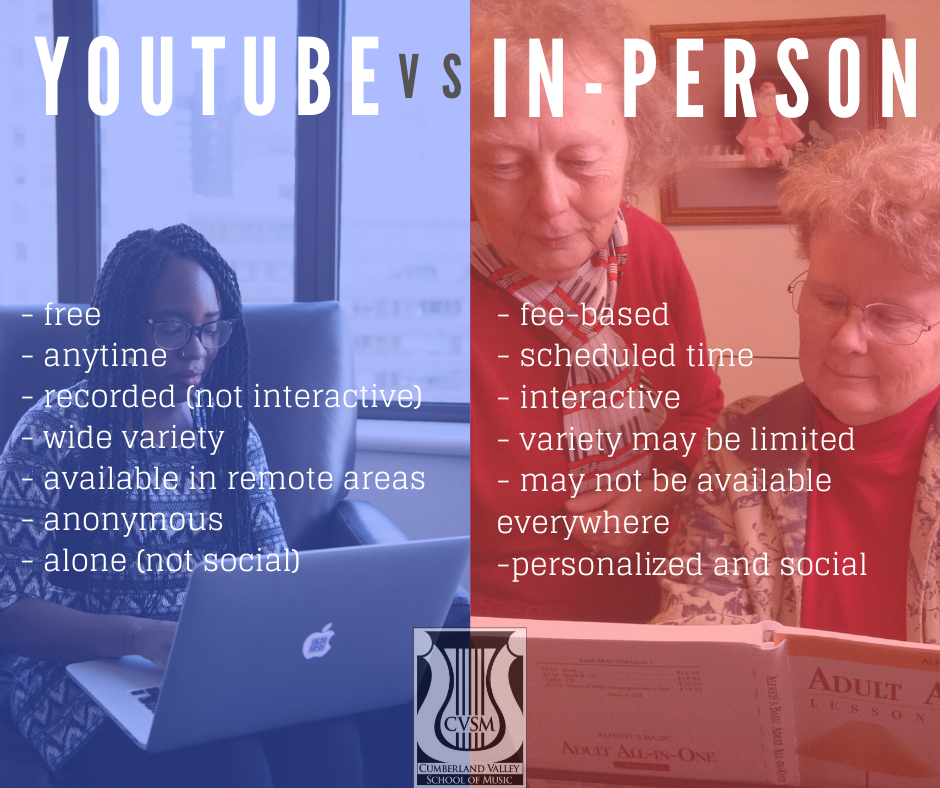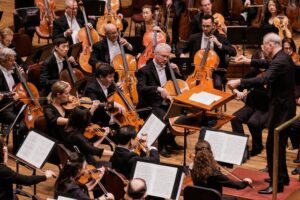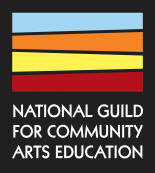With access to wifi and an internet device, we can learn just about anything from anywhere. This is an amazing age of having information at our fingertips! For many people, it may have been a challenge to imagine those first room-size computers eventually being able to fit into our pockets, but that is the reality of now. Not only can we use and learn from the content on the internet, we can also create content (such as this blog post!). This includes MUSIC.
There are many websites and online communities where people can go to learn music theory, download sheet music, and learn to perform music on an instrument or with their voice. When it comes to online music lessons, YouTube has a vast library of lessons. Want to learn the basics of holding a violin? Check. Want to learn a specific guitar riff? Check. Want to learn a plagal cadence? Check. Want to learn how to compose a pop song? Check. Want to have an interactive musical experience? Nope.

There are various differences between YouTube learning and in-person lessons (see graphic), but the biggest is the level of personal interaction between the student(s) and the instructor(s). Music lessons that are in-person are flexible, adaptable, social, and personal. The student can share their personal interests and goals with the instructor, and the instructor can adapt the instruction to the needs of student. Not to say that instruction can’t be done virtually via Skype, FaceTime, or any other virtual method (that is a post for another day). For the purposes of this post, I am focusing on recorded or one-way videos (such as Facebook Live).
- Cost: The recorded lesson is free to the student, with no income to the instructor (unless they have ads or sponsors). The in-person lesson involves a fee to the students which is income for the instructor and payment for their expertise and time.
- Scheduling: A recorded lesson can be taken anytime from almost anywhere, while there is a scheduled date and time for the in-person lesson, often at a specific location.
- Interaction: Only the comments section offer a somewhat interactive component to the recorded lesson. The entire lesson is interactive when in-person, offering specific feedback to benefit the student.
- Variety of topics: There is a WIDE variety of topics available online, whereas one particular teacher may have a limited number of topics they are qualified to teach in-person. Depending on where the student lives and how far they are willing to travel to learn in-person on a specific topic, this will limit what is available.
- Availability: If a student lives in a remote area, there may not be any teachers of the music topic they wish to explore. Hopefully, they will have online access and have all of the information available through the internet, although some remote areas also make that challenging.
- Other factors: An in-person lesson is a personalized, social activity (usually one-to-one, but can also be group). Recorded lessons are completely universal (not personalized), anonymous (no one will know what you are learning), and lack a social component, unless the student chooses to comment and initiate some type of interaction with other viewers or with the instructor.
As a student is learning the guitar riff from a video, how will they know that their hand position is correct? That the guitar is tuned correctly? That they are at the correct fret and/or applying appropriate pressure? That the guitar is a quality instrument without issues that affect the playing and sound of the instrument? That they are sitting or standing with appropriate posture? That they are using the correct technique?
Video learning is a great supplement for in-person learning. Go ahead and search for that specific song or technique you want to learn! But the foundation of the musical learning will be strongest when built in an interactive student and instructor format. Many instructors point their students to online lessons. This is analogous to attending a workshop or clinic… at least one in which you are not able to participate actively in the instruction. And as many of us know, sometimes we learn best when a topic is presented in a variety of styles from different sources.
So, if you or your child desire to learn an instrument or improve your singing skills, find a qualified instructor to take in-person lessons, and supplement that instruction with the wealth of knowledge on the internet.
Written by: Heather McEndree, January 2020


 Imagine if you arrived at the Kennedy Center to hear the NSO perform Beethoven’s No. 5 symphony, but to your surprise, only the violin section appeared on stage with all other instruments and their accompanying maestros completely absent. Imagine that you pulled up one of your favorite songs, “More Than Words” by Extreme, hit play, and heard only one member of the band singing, while the other with his masterful harmonies was suddenly gone. Or imagine singing “Row, Row, Row Your Boat” rounds alone.
Imagine if you arrived at the Kennedy Center to hear the NSO perform Beethoven’s No. 5 symphony, but to your surprise, only the violin section appeared on stage with all other instruments and their accompanying maestros completely absent. Imagine that you pulled up one of your favorite songs, “More Than Words” by Extreme, hit play, and heard only one member of the band singing, while the other with his masterful harmonies was suddenly gone. Or imagine singing “Row, Row, Row Your Boat” rounds alone. How about your own performance? Consider that recital, audition, presentation, or interview you’ve got coming up. Where’s your focus? What someone will think about you after it’s over?
How about your own performance? Consider that recital, audition, presentation, or interview you’ve got coming up. Where’s your focus? What someone will think about you after it’s over? For small children and their caregivers, attending a music class together can create bonds between them as well as provide connections with other families in the community. Children are inherently musical and will love sharing this experience with a parent or grandparent. As the children learn a variety of age-appropriate skills (gross & fine motor skills, impulse control, coordination, etc.) the caregivers learn to respond to their children and support them as they learn new skills.
For small children and their caregivers, attending a music class together can create bonds between them as well as provide connections with other families in the community. Children are inherently musical and will love sharing this experience with a parent or grandparent. As the children learn a variety of age-appropriate skills (gross & fine motor skills, impulse control, coordination, etc.) the caregivers learn to respond to their children and support them as they learn new skills.



Recent Comments